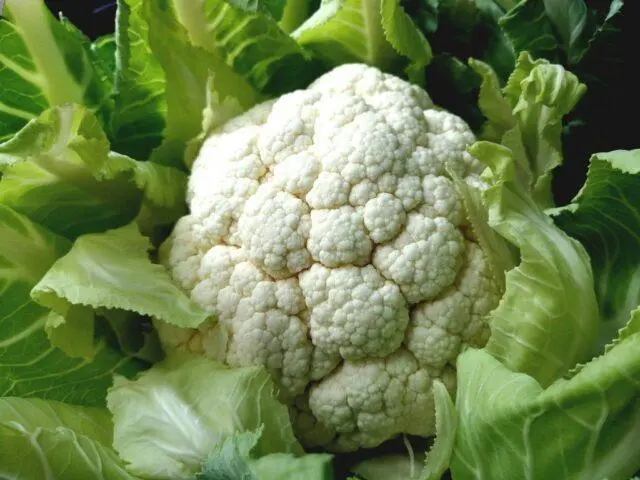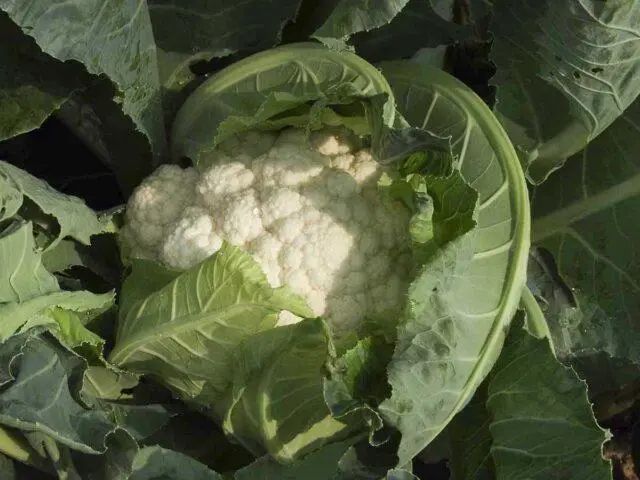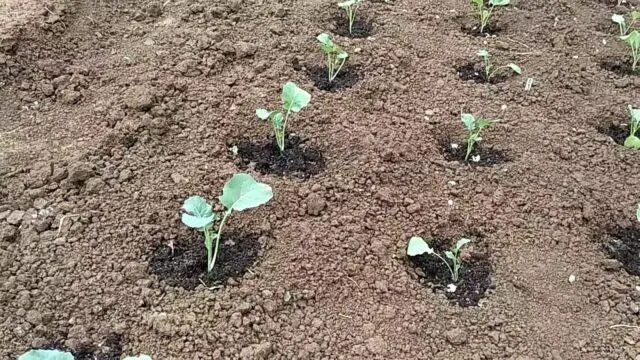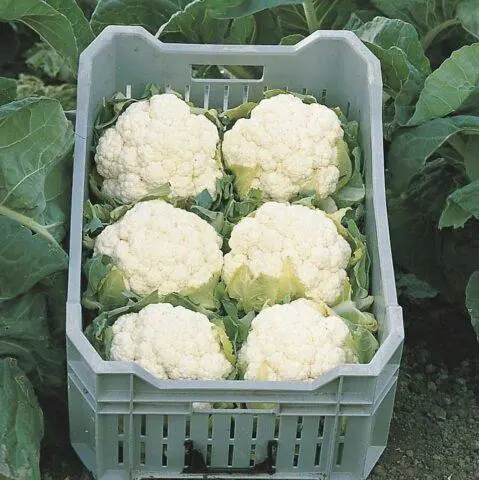Contents
Cauliflower is a crop that is rarely found in the gardens of vegetable growers. However, there are lovers involved in its cultivation. If we talk about the preferred varieties, then one of the most popular is the Goodman F1 cauliflower. It is characterized by unpretentiousness, high productivity, as well as good taste and nutritional qualities.

Cauliflower Goodman F1 approved for cultivation throughout Our Country
Description of Cauliflower Goodman
Cauliflower Goodman F1 is a member of the Cruciferous family. It belongs to medium-early, high-yielding varieties that are suitable for growing in different climatic zones. The hybrid is universal, has an attractive appearance, good taste, and a rich chemical composition.
The Goodman F1 variety was bred by the breeders of the Dutch company Bejo Zaden BV. It was included in the State Register in 2000 for cultivation throughout Our Country with recommendations on planting dates depending on climatic conditions.
Externally, the Goodman F1 cauliflower has a rounded shape. The plant forms a rosette of wavy leaves on a vertical cylindrical stem, which are directed upwards. Peduncles underdeveloped, collected in a dense bunch of even rounded shape, also called the head. It has a delicate cream shade, slightly wavy and quite large, about 10-12 cm in diameter. The average weight of the head varies between 600-700 g.
The bush itself is compact, but the leaf plates are large, partially covering the head, which prevents it from yellowing. The root system is located shallow, fibrous without axial root.
The palatability of Goodman F1 cauliflower is marked as high. The pulp is dense, crispy and at the same time quite tender with a sweetish aftertaste. In use, this cabbage is universal, it can be consumed raw, as well as after heat treatment by boiling and frying. It is ideal for stewing and baking, suitable for preparing diet food, for pickling or freezing for the winter.
Productivity
Goodman F1 cauliflower is famous for its stable yield. From 1 sq. m you can get up to 5 kg of quality vegetables. The average figure varies from 3 to 4,5 kg per square meter. m.
Advantages and disadvantages of the variety
Despite the fact that cauliflower is not popular among gardeners, those who grow the Goodman F1 variety still describe the culture positively.

The keeping quality of Goodman F1 cauliflower is high, it can be safely stored for up to a month at a temperature of 0-2 ºC
Pros:
- suitability for cultivation in any climatic zones;
- medium early ripening;
- high yield;
- stretched and long fruiting;
- excellent taste;
- attractive product appearance;
- excellent staying power.
Cons:
- capriciousness to grow;
- needs constant feeding with nitrogen-containing fertilizers.
Peculiarities of growing
Cauliflower Goodman F1 can be grown by direct sowing in open ground, as well as seedlings. The second method is the most relevant, since the germination of seeds in the garden has an average probability. The culture is demanding on the soil, it grows best on chernozem and loam, while the acidity should be neutral.
When and how to plant Goodman cauliflower for seedlings
For seedlings, Goodman F1 cauliflower seeds are recommended to be sown in the second half of April. The soil is prepared in advance, for this you can use a ready-made substrate or mix it yourself from equal parts of peat and earth.
Sowing seeds is carried out to a depth of not more than 1 cm with a distance of 7-10 cm from each other. They are covered with soil or sand on top, then moistened well with a spray bottle.
In order for the seeds to sprout faster, it is important to maintain the temperature within + 20-22 ºC. As soon as the first shoots appear, the seedlings must be moved for a week to a place where the temperature will not exceed +10 ºC. After seven days, cabbage sprouts are planted in separate containers, diving at the same time, and then moved to a room with + 12-15 ºC for ten days.
Planting seedlings in the ground
For planting seedlings in open ground, a garden bed is first prepared. At the same time, they begin to prepare the soil in the fall by digging and fertilizing it. With increased acidity, it is neutralized by adding slaked lime. In the spring, the soil is again dug up and wood ash, humus and nitrogen-containing complexes are added to it.
Planting cauliflower seedlings is carried out approximately in mid-May. Seedlings are planted in a checkerboard pattern according to the scheme 35 by 45 cm. The sprouts are deepened to the first leaves, the earth is lightly tamped and watered well under the root.

In order for seedlings to easily adapt to new conditions, they are hardened before transplanting into open ground.
Further Care
After planting seedlings of Goodman F1 cauliflower, it is important to follow some care rules to ensure its full development. Since representatives of the Cruciferous family are moisture-loving plants, watering should be taken seriously. The ideal soil moisture schedule would be once every 5-6 days. If watering is done more often, then moisture will accumulate, which will lead to decay of the root system. But the rare irrigation of the land is fraught with a decrease in the yield of cauliflower.
The hybrid variety responds very well to top dressing. After transplanting seedlings, it is possible to fertilize the soil for the first time after two weeks. Nutrient formulations are selected with a high nitrogen content. As a top dressing, you can also use chicken manure, which is diluted with water in a ratio of 500 g per 10 liters. Then the cabbage is fed at intervals of two weeks, the plant is fed at least three times during the season.
Loosening the soil for cauliflower is undesirable, since it has a superficial root system, it is easy to damage it. It is best to mulch with peat or humus.
As a pest prevention, you can use an infusion of burdock leaves. When infected with caterpillars, cabbage whites or scoops, the plant is treated with insecticides.
Harvesting and storage of crops
Due to non-simultaneous ripening, Goodman F1 cauliflower is harvested in multiple passes. The heads are removed from the bushes as they mature. As a rule, the first heads of cabbage can already be harvested, approximately 75 days after planting in open ground.
The cut of the head of cabbage is carried out with the help of a sharp knife with the capture of several sheets, but the cabbage should not be broken off in order to avoid damaging it. After harvesting, the vegetables are placed in a dark, cool room. If the cabbage needs to be kept fresh for the winter, then the heads of cabbage are laid out in one row in wooden boxes on a paper bed, and they are covered with parchment paper on top. For long-term storage, cauliflower is transferred to the cellar.

You can store cauliflower on the balcony, provided that the temperature is within 0-2 ºС
Conclusion
Cauliflower Goodman F1 has mostly positive reviews from gardeners. This variety is high-yielding, while a good presentation and taste are also noted.










